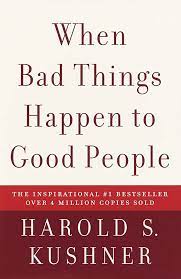Articles/Essays – Volume 16, No. 2
One Flawed View for Another | Rabbi Harold S. Kushner, When Bad Things Happen to Good People
A silo collapsed and buried my brother in-law under tons of grain. At his funeral, a speaker offered comfort by saying that God “had need of Leon on the other side.” One of Leon’s young children whispered to me, “But I need him too.”
A four-year-old could see problems with the speaker’s attempt to comfort the family by justifying their loss. Rabbi Harold S. Kushner analyzes what’s wrong with this and a good many other traditional Jewish and Christian “comforts” — most of which will ring familiar to LDS ears, professed differences in theology notwithstanding: God is trying to teach you a lesson. God is testing you. God punishes those he loves. It’s probably for the best. It could be a lot worse. God gives people what they deserve. Did you pray? Kushner’s intent in When Bad Things Happen to Good People is to express empathy and compassion and help those good people make sense of their world and their God when the bad things happen.
Though he declares repeatedly that any Job needs sympathy and compassion more than lessons in theology, his book is largely a nonacademic illustrated theological treatise. He can’t keep theology out of com fort any more than most of us can. What we feel isn’t divorced from what we believe. Readers who’ve suffered well-meaning but hurtful advisers can find some solace in Kushner’s demolition of the standard cliches and also in some reasonable alternatives he offers: for example, God doesn’t cause everything that happens; people have choices about how they handle hurt; the natural world usually operates according to orderly laws; we can help each other and love each other.
However, Kushner’s good ideas and in sights are enmeshed with generalizations, contradictions, and assumptions which color the comfort he offers. His reasoning is sometimes as faulty as that which he de cries. For example, he seems to take psychological theory as fact and generalizes about all people from his own experience: “Whenever bad things happen to good people . . . there will almost certainly be feelings of anger. It seems to be instinctive to become angry when we are hurt” (p. 104). Freudians will be pleased with the reference to “instinct,” but there are other psychologists who won’t.
Kushner also lacks sophistication about the physical world: “The world is mostly an orderly, predictable place . . . but every now and then, things happen not contrary to the laws of nature but outside them” (p. 52). One of the examples he cites for support is the path of a hurricane, because meteorologists can’t predict it with certainty. Our present ability to predict their paths is hardly a measure of whether hurricanes operate according to any laws.
Furthermore, Kushner contradicts him self. In one chapter he defends the idea of agency and its part in human experience: “The murder and the robbery . . . represent that aspect of reality which stands independent of His will” (p. 55). But later he writes, “Fate, not God, sends us the problem,” and, “What good is He, then? God makes people become doctors and nurses to try to make you feel better” (p. 129). If fate makes a robber beat me, and God makes doctors and nurses choose to treat me (I thought money had at least some thing to do with it), where’s the agency Kushner claims for any of us?
Kushner assumes that what he doesn’t know with certainty can’t be known with certainty: “Neither I nor any living person can know anything about the reality of that hope [life after death]” (p. 28). How much can he know about every living person?
I like many of Kushner’s ideas but have little admiration for his ways of constructing a world view from them. He critiques well the arbitrary orderliness some people attach to all events by attributing them to God’s specific intervention; however, the only alternative he sees is chaos — not the specific apparent randomness of colliding subatomic particles, but the more comprehensive randomness of life without mean ing in a universe without order. In the process of rescuing God from those who claim to know exactly what he’s doing in our painful Utopia, Kushner would have us see him as a well-meaning but imperfect comforter whom we must learn to “love and forgive despite His limitations” (p. 148) if we are to make comfortable sense of the painful game of dice we call life. I think there are better ways of seeing God and life, with and without personal revelation.
The book has been on the best-seller list for months, suggesting that many people still want answers to the questions Kushner addresses. Whether readers feel satisfied with his answers will depend largely upon their own contexts for reading them, and their own invincible viewpoints. LDS readers in general are likely to sit up a little straighter upon reading ideas such as, “Having created the animals and beasts, He says to them: ‘Let us arrange for a new kind of creature to emerge, a human being in our image, yours and Mine” (italics his, pp. 72-73). . . . They [Adam and Eve] must leave the garden and no longer eat the fruit of the Tree of Life” (italics mine, p. 73).
We all, as Paul said, see through a glass darkly as yet. We find and then usually defend and try to propagate our own glimpses of truth and our own brands of comfort. In my view, Kushner has produced a world view as flawed as those which he quite admirably critiques.
When Bad Things Happen to Good People by Rabbi Harold S. Kushner (New York: Schocken Books, 1981), 149 pp., $10.95.


 Back to full Issue
Back to full Issue

